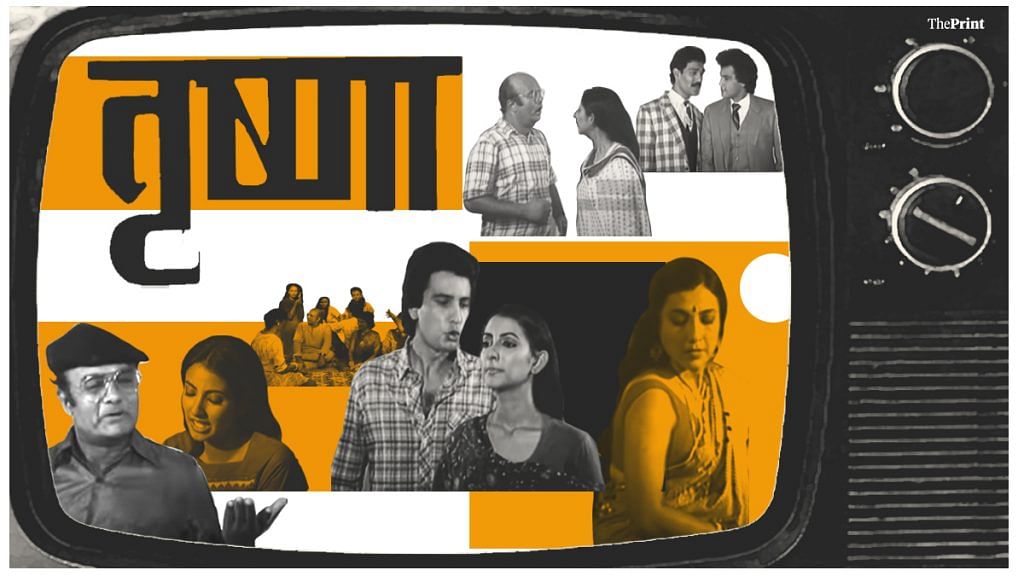It is a truth universally acknowledged that screen adaptations of much-loved books often deviate too far from the source material and omit some of our favourite parts. It’s obviously a subjective complaint, given everyone has different favourite bits. But Trishna is one adaptation that will largely pass the faithfulness test.
The 1985 DD National show is adapted from Jane Austen’s 1813 classic novel Pride and Prejudice. It perfectly transports the 19th-century England of Austen’s seminal work into the realities of 20th-century India.
Created by Meena Vaishnavi and written by Kamna Chandra, the story revolves around a middle-class family in Mumbai with four (one of rare deviations, given that the book had five) unmarried daughters — a fact that gnaws away at matriarch of the house Sushila (Ratna Bhushan), who, much like Austen’s Mrs Bennett, spends all her time trying to find suitable matches for her girls, especially the eldest, Roopa (Aparna Sharma).
When wealthy Ravi Chopra (Vilas Kalgutkar) moves to Mumbai, the pesky, determined Sushila instantly jumps to action to introduce him to Roopa. While there’s instant infatuation between Roopa and Ravi, there’s palpable tension and tangible sparks between her sister Rekha (Sangeeta Handa) and Ravi’s aloof best friend, Rahul Mehta (Tanrun Dhanrajgir).
And, like in the novel, what follows is class conflict, misunderstandings, family troubles and the eventual happy ending that we all know and love Austen’s book for.
Also read: Hum Log, India’s first soap opera and DD’s experiment with foreign cinema
Relatable to Indian audiences
“The show was very well received, people would tell me just how restlessly they would wait for it to air on a Sunday morning!” Kamna Chandra, the show’s writer, tells ThePrint. “Even though Austen’s story is set in 19th-century England, the story finds ground in Indian culture,” she adds, noting that any mother of daughters, especially back in the day, would be concerned about her marital prospects.
But it wasn’t just the subject that made it a hit. It was the gentle, clever touches that made the family come alive.
In the first episode, central characters gracefully come to life on screen. So the sisters’ first appearance is when they are in the middle of a game of Scrabble. It at once establishes their bond as well as the fact that these are educated women, they are comfortable speaking in English — yet they stumble upon words not all of them know, which is instantly relatable and comforting.
Later, Rekha asks her father to look over her article, hinting at a career.
And the realistic performances, especially by Handa and Dhanrajgir, made the show a must-watch. “I have watched everything Jane Austen and I am so delighted with Trishna, which met all my expectations,” Rushika Banerji, a student at TISS Hyderabad, tells ThePrint. “Rekha oozes the essence of Lizzie Bennett and watching her relationship with Rahul was a delight to watch,” she adds.
Meanwhile, the parents, Anand and Sushila, play off each other perfectly to show the changing mores of 1980s India, caught between conservatism and a brave new world. While the mother wants her daughters to get married at all costs, the father neither obsesses over marrying off his girls nor does he force them into relationships, and often puts their life choices over his own preferences for them.
Also read: Fauji: The show that launched a broody, chain-smoking SRK on the path to Bollywood glory
The title of the show
It is well known that the title of Pride and Prejudice comes from Darcy and Elizabeth’s shedding of their pride and their prejudices towards each other, as they learn to see each other beyond the surface and gradually fall in love. The name of Doordarshan’s show adds a different dimension into the story.
“Trishna means thirst or desire, it stands for the thirst of a mother wanting her daughters to get happily married, the thirst in Rekha and Rahul for passionate, genuine love,” Chandra explains, elaborating that almost every character in its own was constantly yearning for something.
It does hold true for all the other characters in the show — the younger sisters Rita and Ruhi desired learning and adventure respectively, Sushila wanted nothing more than good matches for her daughters, Roopa and Ravi yearned for each other.
Today, many are rediscovering the serial after Prasar Bharti dug it out from the DD archives and uploaded the episodes on YouTube. “My aunt used to tell me about the show all the time, I finally get to watch it,” Rushika enthuses. “I was relieved to find it matched all my expectations.”
Also read: Idhar Udhar, the Hindi sitcom we desperately need today
